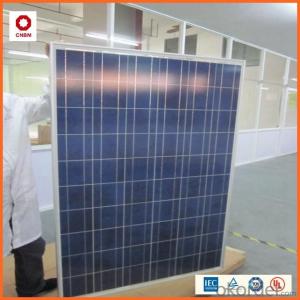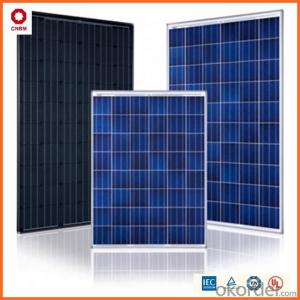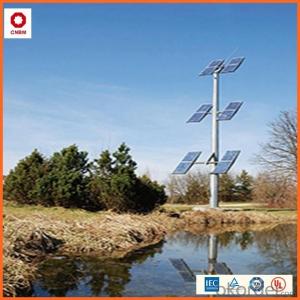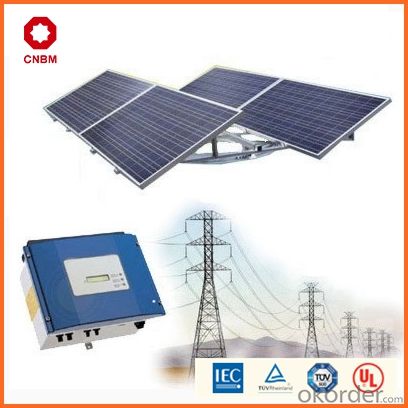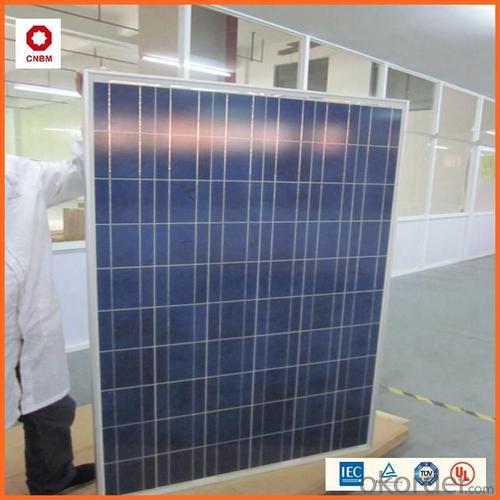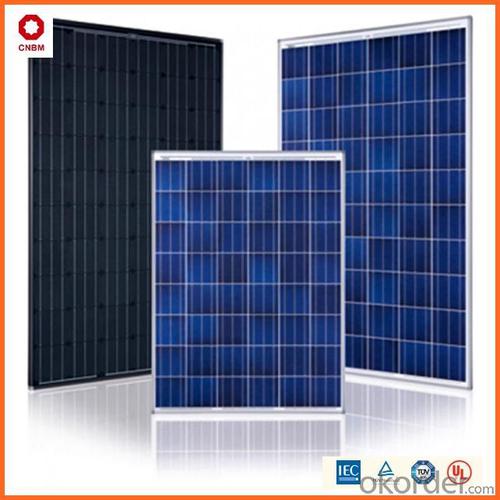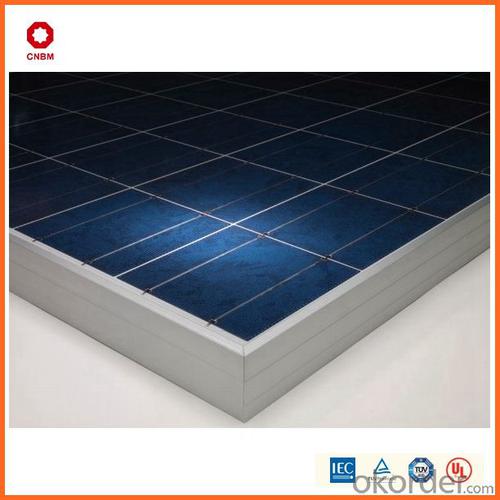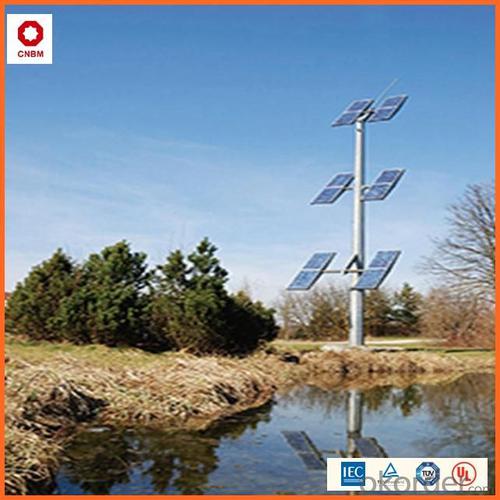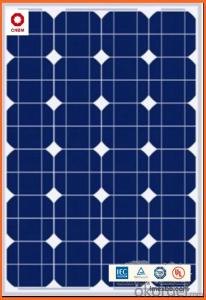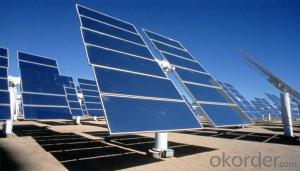Best Value 45w Small Solar Panels with Good Quality
- Loading Port:
- China main port
- Payment Terms:
- TT OR LC
- Min Order Qty:
- 1 watt
- Supply Capability:
- 10000000 watt/month
OKorder Service Pledge
OKorder Financial Service
You Might Also Like
Specification
Hot Sale !!! Quality and Safety of Small Poly Solar Panel 25~85w
1. Rigorous quality control meets the highest international standards.
2. High-transmissivity low-iron tempered glass, strong aluminium frame.
3. Using UV-resistant silicon.
4. IS09001/14001/CE/TUV/UL
Warranties of Small Poly Solar Panel 25~85w
1. 10 years limited product warranty
2. 15 years at 90% of the minimal rated power output
3. 25 years at 80% of the minimal rated power output
Specification
Characteristics of Poly solar panels CNBM (25-85W) | |||||
Max Power Voltage Vmp(V) | 30.3 | 30.8 | 31.1 | 31.4 | 31.85 |
Max Power Current Imp(A) | 7.60 | 7.64 | 7.73 | 7.81 | 7.85 |
Open Circuit Voltage Voc(V) | 36.1 | 36.6 | 37 | 37.3 | 37.68 |
Short Circuit Current Isc(A) | 8.50 | 8.55 | 8.65 | 8.75 | 8.85 |
Max Power Pm(W) | 230W | 235W | 240W | 245W | 250W |
Temperature Coefficient of Cells Poly solar panels CNBM (25-85W) | |
NOCT | 45± 2 |
Temperature Coeffucients of Isc | 0.0492 |
Temperature Coeffucients of Voc | -0.3374 |
Temperature Coeffucients of Voc | -0.4677 |
Mechanical Data of Poly solar panels CNBM (25-85W) | |
Dimension | 1638 × 982 × 40 mm |
Weight | 19.5 kg |
No. of Cells and Connections | 60 (6 ×10) |
Tolerance | 0 ~ + 5 W |
Cell | Monocrystalline Cell 156 × 156 mm |
Packing | 624 Pcs/40ft(H) Container |
Limits of Poly solar panels CNBM (25-85W) | |
Operating Temperature | -40 to +85 |
Storage Temperature | -40 to +85 |
Max System Voltage | 1000VDC(IEC) / 600VDC(UL) |
Features of our products:
• High conversion efficiency mono/poly-crystalline amorphous silicon solar cells
• Modules incorporate high performance bypass diodes to minimize the power drop caused by shading
• High transmittance, low-iron tempered glass
• High performance EVA encapsulant to prevent destroying and water.
• AI frame: without screw, corner connection. 8 holes on the frame can be installed easily
• Good performance of preventing from atrocious weather such as wind and hails
• Certifications: CE IEC TUV VDE UL, Class I
• 10 years 90% power output warranty

Shipping of Small Poly Solar Panel 25~85w
By Sea | Delivery from Shanghai or Ningbo seaport |
By Air | Departure from Shanghai Pudong Airport |
By Express | Post by DHL, EMS, UPS, TNT. |
- Q: How do solar energy systems impact energy access in developing countries?
- Solar energy systems have a significant positive impact on energy access in developing countries. These systems provide a sustainable and reliable source of electricity, especially in regions with limited or no access to the traditional grid. By harnessing the abundant sunlight, solar energy systems help bridge the energy gap, bringing power to remote communities, schools, hospitals, and households. This not only improves the quality of life for individuals but also supports economic development, enhances educational opportunities, and enables access to essential services such as healthcare and communication. Additionally, solar energy systems reduce reliance on fossil fuels, mitigating environmental pollution and combating climate change. Overall, solar energy systems play a crucial role in expanding energy access, empowering communities, and fostering sustainable development in developing countries.
- Q: How can I find a reputable solar energy system installer?
- To locate a trustworthy installer for your solar energy system, you can follow these steps: 1. Educate yourself and conduct research: Begin by familiarizing yourself with solar energy systems, their functioning, and the various installation options. This will enable you to grasp the fundamentals and make well-informed decisions during the selection process. 2. Seek recommendations: Reach out to friends, family, colleagues, or neighbors who have already installed solar systems. Inquire about their experiences with the installers they hired, the quality of their work, and any challenges they encountered. Recommendations from reliable sources can be valuable in finding reputable installers. 3. Verify credentials and certifications: Ensure that the installer you are considering possesses the necessary licenses, certifications, and insurance to carry out solar installations. Look for certifications from esteemed organizations like the North American Board of Certified Energy Practitioners (NABCEP) or the Solar Energy Industries Association (SEIA). 4. Explore online reviews and ratings: Delve into online review platforms such as Google, Yelp, or Angie's List to read customer reviews and ratings about various solar installers in your vicinity. Pay attention to recurring positive or negative feedback and consider the overall reputation of the installers. 5. Obtain multiple quotes: Reach out to several solar installers and request detailed quotes for your specific project. Take note of the proposed equipment, warranties, pricing, and any additional services included. This will enable you to compare different installers and make an informed decision. 6. Request references and review past projects: Ask the installer for references to speak with previous customers about their experiences. Inquire about the quality of work, timeliness, customer service, and any issues encountered. Additionally, request examples of past projects completed by the installer to assess their workmanship and attention to detail. 7. Evaluate warranties and after-installation services: Inquire about the warranties provided by the installer for both the equipment and the installation work. A reputable installer will offer comprehensive warranties to ensure the longevity and performance of your solar system. Additionally, ask about any after-installation services they provide, such as maintenance, repairs, or monitoring. 8. Seek multiple opinions: If you have any doubts or concerns during the selection process, do not hesitate to seek a second opinion from another reputable installer. This can help you gain further clarity and confidence in your decision. Remember, finding a reputable solar energy system installer is vital for the long-term success and performance of your solar system. Take your time, conduct thorough research, and select an installer that aligns with your needs, budget, and values.
- Q: Can solar energy systems be used for commercial purposes?
- Yes, solar energy systems can definitely be used for commercial purposes. In fact, many businesses across various industries are increasingly adopting solar power systems to reduce their reliance on traditional energy sources and lower their carbon footprint. Solar energy can be harnessed through photovoltaic (PV) panels or solar thermal systems, providing a clean and renewable source of electricity or heat for commercial buildings, manufacturing facilities, retail stores, and other commercial spaces. Moreover, installing solar energy systems can also lead to long-term cost savings and contribute to building a sustainable and environmentally friendly brand image.
- Q: What is the role of solar energy systems in reducing energy inequalities?
- Solar energy systems play a crucial role in reducing energy inequalities by providing access to clean and affordable electricity to communities that are often marginalized or lack access to traditional energy sources. These systems enable individuals and organizations to generate their own power, reducing their dependence on centralized energy grids and increasing their energy independence. This empowers communities to break free from energy poverty, improve their quality of life, and bridge the energy gap between developed and developing regions. Moreover, solar energy systems contribute to a more sustainable and equitable future by reducing greenhouse gas emissions and mitigating the adverse impacts of climate change on vulnerable populations.
- Q: Can solar energy systems be used in areas prone to hurricanes or earthquakes?
- Yes, solar energy systems can be used in areas prone to hurricanes or earthquakes. While these areas may experience natural disasters, solar panels are designed to withstand harsh weather conditions. They are securely mounted to withstand high winds and are made of durable materials. Additionally, solar energy systems are decentralized and can provide power even if the grid is disrupted during a hurricane or earthquake.
- Q: Can solar energy systems be used for powering electric vehicle wireless charging systems?
- Yes, solar energy systems can indeed be used for powering electric vehicle wireless charging systems. The energy generated from solar panels can be converted into electricity and stored in batteries. This stored energy can then be utilized to power wireless charging stations for electric vehicles, providing a sustainable and renewable source of power for their charging needs.
- Q: Can solar energy systems be used in areas with limited access to transportation?
- Yes, solar energy systems can be used in areas with limited access to transportation. Solar panels can be transported to these areas using alternative methods such as by foot, bicycle, or even by using local transportation options like boats or animal-drawn carts. Additionally, once installed, solar energy systems require minimal maintenance and can provide clean and reliable electricity without the need for ongoing transportation of fuel or resources.
- Q: Can solar energy systems be used for powering remote monitoring systems?
- Yes, solar energy systems can be used for powering remote monitoring systems. Solar panels can generate electricity from sunlight, which can then be stored in batteries for use during non-sunny periods. This makes solar energy a reliable and sustainable power source for remote monitoring systems, allowing them to operate off-grid and in remote locations without access to traditional electrical infrastructure.
- Q: Can solar energy systems be used in areas with limited roof access for maintenance?
- Solar energy systems can indeed be utilized in areas where roof access for maintenance is limited. Although the usual practice is to install solar panels on rooftops for maximum exposure to sunlight, there are alternative choices to consider. One option is to install ground-mounted solar panels in areas where roof access is restricted, making maintenance and cleaning tasks simpler. Furthermore, solar panel systems can be integrated into other structures like carports or pergolas, offering an alternative approach to the conventional rooftop installations. These alternatives guarantee the effective utilization of solar energy systems in areas with limited roof access for maintenance.
- Q: Do solar energy systems require a backup battery system?
- No, solar energy systems do not necessarily require a backup battery system. However, adding a battery storage system can provide benefits such as storing excess energy generated during the day for use at night or during power outages.
Send your message to us
Best Value 45w Small Solar Panels with Good Quality
- Loading Port:
- China main port
- Payment Terms:
- TT OR LC
- Min Order Qty:
- 1 watt
- Supply Capability:
- 10000000 watt/month
OKorder Service Pledge
OKorder Financial Service
Similar products
Hot products
Hot Searches
Related keywords

